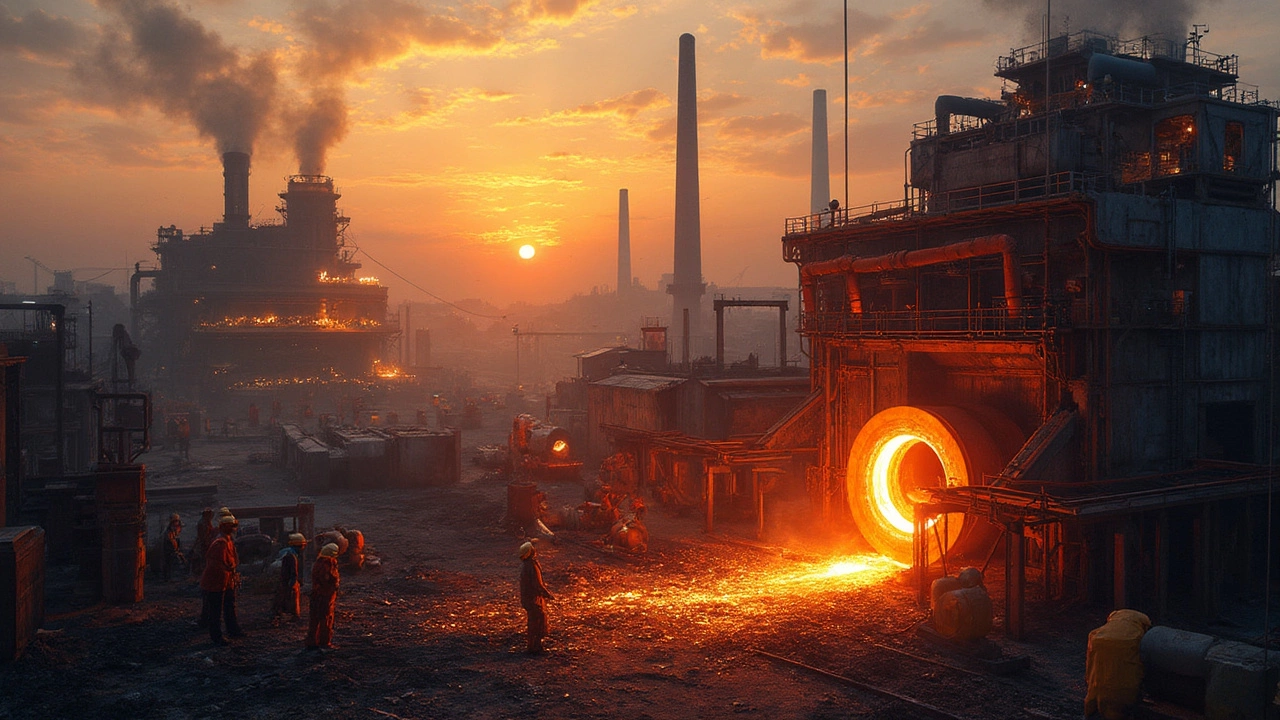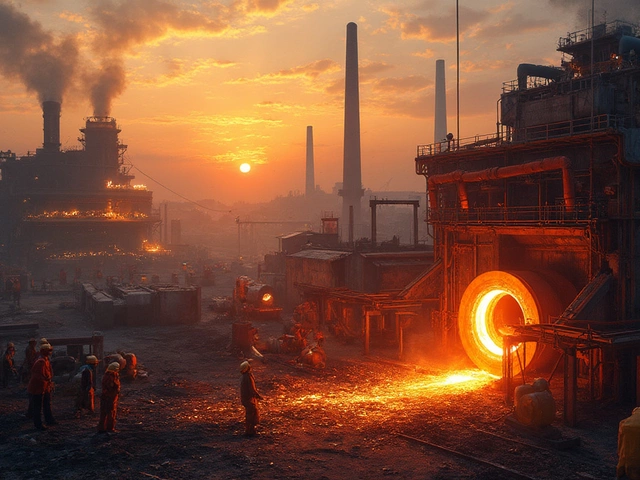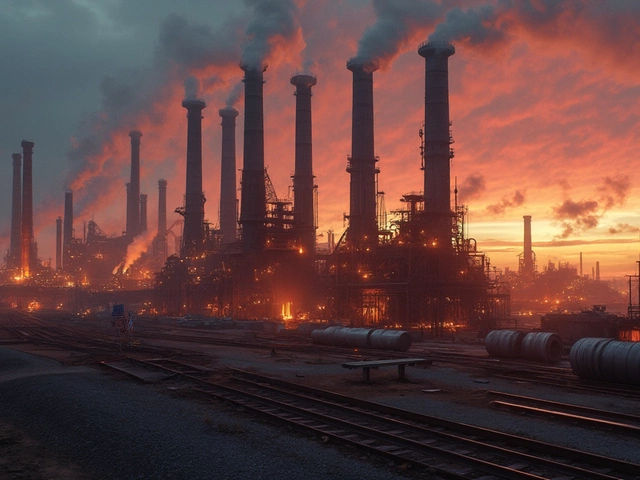When it comes to steel, not all products are created equal. The quality of steel can significantly impact everything from construction projects to manufacturing and beyond. So, who’s at the top of the game in producing the best steel? The answer often hinges on several factors, like the raw materials used, manufacturing processes, and the technology employed by these steel giants.
First up, let's talk about what we mean by 'quality' in steel. Quality isn't just about having shiny, resilient metal. It involves strength, durability, and specific properties that cater to the intended use. For instance, the steel used in making surgical instruments will differ from that used in constructing skyscrapers. So, knowing what you need is crucial.
It's not just about blending iron and carbon. High-quality steel starts with the right mix of ingredients. Leading manufacturers focus on the purity of their raw materials and the precise control of their compositions. They invest in advanced technologies to achieve this, ensuring their steel meets strict international standards. This commitment distinguishes top-tier players from the rest.
- Understanding Steel Quality
- Top Manufacturers Worldwide
- What Makes Their Steel Stand Out
- Choosing the Right Steel for You
Understanding Steel Quality
The phrase 'quality steel' gets tossed around a lot, but what does it actually mean? At its core, quality steel refers to the strength, durability, and characteristics of the steel that align with the specific needs of its application. Whether it's used in automobile manufacture, construction, or high-tech industries, each use case demands something different.
What Factors Determine Steel Quality?
The quality of steel primarily hinges on its composition and the processes involved in producing it. The two main ingredients—iron and carbon—are altered to create different steel types. Typically, steel with a low carbon content is softer and more malleable, making it great for bending and forming. On the flip side, high carbon content produces a harder, more brittle steel, better for tools and cutting implements.
Technology plays a key role too. Modern steel manufacturers use state-of-the-art equipment like electric arc furnaces to achieve precise temperatures and conditions, allowing them to control the homogeneity and purity of the steel produced.
- Purity Levels: Impurities like sulfur and phosphorus can weaken steel. Top companies make sure to minimize these substances.
- Consistency: Consistent quality permits seamless product performance. Leading manufacturers prioritize maintaining uniform quality across batches.
- Innovations: The adoption of new technology such as Artificial Intelligence (AI) in monitoring and quality control is becoming a game-changer in enhancing production.
Standards and Certifications
High-quality steel isn't just about company assurance. It’s also about meeting stringent international standards. Organizations like the American Society for Testing and Materials (ASTM) and the International Organization for Standardization (ISO) provide guidelines and certifications that ensure steels' reliability and safety. For example, the ISO 9001 certification is a mark of quality management that speaks volumes about a manufacturer's commitment to excellence.
| Standard | Organization |
|---|---|
| ISO 9001 | International Organization for Standardization |
| ASTM A615 | American Society for Testing and Materials |
These standards cover everything from tensile strength to how steel behaves at low temperatures, ensuring the product can withstand its intended environment.
Simply put, understanding steel quality involves looking at its composition, the technology behind its production, and the standards it meets. All these factors make some companies stand out in the field by consistently delivering top-notch products.
Top Manufacturers Worldwide
When it comes to the steel manufacturing giants of the world, a few names consistently rise to the top, recognized for their exceptional quality and innovation. These companies don't just produce quality steel; they set the benchmarks others strive to achieve.
ArcelorMittal
Kicking off with ArcelorMittal, they're often dubbed the largest in the industry. Operating more than 60 plants in 18 countries, they’re leading in both capacity and outreach. What makes them stand out? Their commitment to producing steel with a lower carbon footprint. They're not just making strong steel—they're making it responsibly.
Nippon Steel
Nippon Steel, based in Japan, is another heavyweight. They're renowned for their high-tech advancements and rigorous quality control. Whether it's for automotive or construction, their steel is tailored to meet very specific requirements, which helps them dominate in niche markets.
China Baowu Steel Group
Coming in strong is China Baowu Steel Group, a powerhouse in terms of sheer volume. They have embraced innovation by investing heavily in automation and smart manufacturing. Their adaptation to new technologies allows them to maintain high productivity without compromising quality.
POSCO
Another big player is South Korea’s POSCO. They're highly admired for their superior-grade steel products and efficient production methods. Specializing in producing everything from automotive to shipbuilding steel, POSCO is consistently expanding its footprint across global markets.
United States Steel Corporation
The United States Steel Corporation, or U.S. Steel for short, is a classic American name in the industry. Though smaller compared to the giants like ArcelorMittal, they are known for their innovation, especially in eco-friendly manufacturing processes.
The way these companies leverage technology and resources is why they remain leaders in the steel industry. If you’re looking for dependability and cutting-edge quality, these top manufacturers are certainly notable mentions.

What Makes Their Steel Stand Out
So, what truly sets high-quality steel manufacturing apart from the rest? It boils down to a few key ingredients: technology, expertise, and dedication to quality.
Advanced Technology and Innovations
The best steel producers aren’t just resting on their laurels. They continuously invest in cutting-edge technology to enhance their production processes. For example, AI and machine learning are increasingly used to monitor and optimize operations, ensuring consistent quality and minimizing waste.
Experienced Workforce
Top-tier manufacturers rely heavily on the skill and knowledge of their workers. Experienced engineers and technicians ensure every batch of steel meets rigorous industry standards, keeping a close eye on each step of the manufacturing process.
Stringent Quality Control
A strong commitment to quality control spells the difference between good and great steel. Leading steel plants conduct frequent, thorough quality checks to catch any imperfections before the product reaches market. This dedication results in a final product that you can count on for strength and reliability.
Sustainable Practices
Environmental sustainability is not just a trend; it’s a necessity. Many top steel companies have turned towards eco-friendly practices, such as recycling and energy-efficient production techniques. This not only results in better steel, but also a happier planet.
As an example, here’s a quick snapshot of how manufacturers prioritize sustainable practices:
| Practice | Description |
|---|---|
| Recycling | Use of recycled materials in production to reduce waste. |
| Energy Efficiency | Implementation of technologies that use less energy. |
| Water Conservation | Techniques that minimize water usage in production processes. |
In the end, the key to finding the right quality steel lies in understanding these factors and selecting a producer that aligns with your needs and standards. Only then can you be confident you’re getting the best steel your money can buy.
Choosing the Right Steel for You
Finding the right steel isn't always straightforward, but it’s crucial for ensuring your projects' success. Each type of steel serves unique purposes, from construction to intricate machinery. Let's break down how you can choose effectively.
Identify Your Needs
First things first, what exactly do you need the steel for? Steel comes in tons of different types, each tailored to specific needs. Are you building a high-rise or crafting surgical tools? The end-use determines the properties your steel should have, like tensile strength, corrosion resistance, or ductility.
Learn About Types of Steel
Steel is broadly categorized into four groups: carbon, alloy, stainless, and tool steel. Each has its areas of specialty.
- Carbon Steel: Versatile and generally cheaper. Great for construction projects.
- Alloy Steel: Enhanced with elements like nickel or vanadium. Ideal for piping or energy-related applications.
- Stainless Steel: Contains chromium for rust protection. Best for kitchen appliances or medical tools.
- Tool Steel: Has special hardness and is used for making tools and dies.
Consider Quality Over Cost
While it might be tempting to go for the cheapest option, focusing on quality is key. High-quality steel often saves you more in the long run by reducing failures and maintenance.
| Type of Steel | Common Uses | Average Cost per Ton (2025) |
|---|---|---|
| Carbon Steel | Building & Infrastructure | $500 |
| Alloy Steel | Piping, Tools | $1,200 |
| Stainless Steel | Appliances, Medical | $3,500 |
| Tool Steel | Manufacturing Tools | $2,000 |
Talk to the Experts
Don't hesitate to consult professionals. Steel manufacturers and suppliers are great resources. They can guide you on the specifications and standards that matter most for your project.
In the end, choosing the right steel is about aligning your project needs with the right properties of steel. It might take a bit of research, but it’s totally worth it when you see the durability and functionality it brings to the table.







Write a comment